Why Ravens May Rule the Future of Work
M-Skilled Workers Are Becoming the Ultimate Orchestrators in an AI-Driven World
Are you a cross-disciplinary expert? Do you connect your skills in unrelated fields with a generalist mindset? Do you consider your "lack of focus" an asset rather than a liability? You might be a raven.
I struggled with having too many interests. I know a lot about leadership and organizational design. I'm also a pretty decent book author. Now, I'm diving into AI automation, cartography, and cosmology. My God! Where is the focus?
Do you feel like that as well? Do you have too many domains that interest and excite you?
Maybe you are a raven.
I'm sure this pattern sounds familiar.
Managers are cunning, clever generalists overseeing the work of their direct reports whom they treat as single-domain specialists. At least, that's the traditional approach of the typical enterprise. Just look at practically all open positions for corporate jobs: they seek people with the "right" skills that fit neatly in the predefined boxes delineated by the managers. You're either a "product manager," a "social media marketer," or an "AI workflow builder." They don't want you to be all three. Heavens, no. There's no checkbox for that in their Talent Sourcing and Applicant Tracking Systems.
Now, I am hardly the first person to point out that hiring workers and subordinates for singular roles is an outdated concept in a rapidly changing environment. And I'm also not the first one to suggest that the best managers and leaders are often those with a few specialist tricks up their sleeves themselves. However, I have yet to see these ideas pushed to their inevitable conclusion:
The future of the superior (generalist manager) and the subordinate (specialist worker) is the same. They are merging into one. We are becoming M-skilled orchestrators of skills and intelligence.
The Fox and the Hedgehog
The distinction between generalists and specialists is a classical dichotomy. Maybe even a flawed one. The business world has convinced us we must pick sides in this theatrical performance, but what if the premise is falling apart? What if there's a third option?
In the 1953 essay "The Hedgehog and the Fox" by philosopher Isaiah Berlin, the author draws on an ancient Greek proverb: "The fox knows many things, but the hedgehog knows one big thing". Berlin uses this proverb to classify thinkers into two categories: hedgehogs, who view the world through the lens of a single defining idea, and foxes, who pursue different approaches and experiences.
The fox is a classic symbol of cleverness and versatility. It has a reputation for knowing many tricks and strategies to outsmart its prey and avoid danger. This makes it an ideal representation for generalist thinkers who pursue many ends simultaneously and who draw on a vast, fragmented knowledge base.
The hedgehog is known for its one unbeatable skill: rolling into a spiky, impenetrable ball. This singular, effective tactic makes it the perfect symbol for someone who relates everything to a single, overarching principle or "big idea."
It is hard not to see the parallel with generalists and specialists. Traditional organizations tend to divide their world in two contrasting camps: some (the hedgehogs or specialists) focus deeply on one big idea or principle that shapes their worldview and actions, while others (the foxes or generalists) draw on a wide range of perspectives without reducing the world to a single central truth. And all employees are either specialists or generalists.
The moral of "The Hedgehog and the Fox" suggests that there is value in both approaches—hedgehogs bring clarity through their singular vision, while foxes excel in their adaptability. Awareness of one's own style, and the merits of each, is crucial for personal and intellectual growth.
But what if the generalist-specialist divide is a false dichotomy? What if there is a third option?
What if rapid technological change is making the world increasingly difficult to navigate for both generalists and specialists? What if the versatility of the generalist is useless when the fox doesn't have at least a few specialist tricks up its sleeve? What if the singular focus of the specialist is outdated in an age that requires all hedgehogs to be more nimble?
Maybe some of us were meant to be ravens.
The Culling of the Management Layers
Google founder Sergey Brin recently observed that managers are the easiest to replace with AI. Brutal truth delivered with Silicon Valley charm. Algorithmic management is already dismantling traditional middle management with entire organizational layers vanishing from enterprises like comedians from American talk shows. It turns out that traditional management mostly consisted of expensive human middleware hoarding intelligence, evaluating other people's skill-sets, and making the kinds of decisions that any modern-day "reasoning" LLM can make. Who knew that most management was just pattern matching with better health insurance?
The effect of this hollowing out of the middle management layers is that managers must focus more on business strategy, organizational culture, and human connection. These remaining managers won't just be managing—they'll be wrestling with wicked problems that defy algorithmic solutions while the robots and self-organizing teams handle everything else. But the inconvenient math: organizations need maybe 10% as many people doing that sort of management work. Most problems are not particularly wicked.
Smart managers are already seeing the writing on the wall. They're building multiple specialist skills—product management, AI automation, marketing—not just to survive the culling, but to become genuinely irreplaceable. They do this as a hedge against obsolescence and as a catalyst for innovation. Also, as teams shrink and become more cross-functional, tomorrow's managers need to be more hands-on than ever. Fancy business suits get replaced by rolled-up sleeves.
The managers who can think in a cross-disciplinary way (because they sink their teeth into multiple domains) are much harder to fire than those who're just twiddling their thumbs while everyone else is doing the work.
"The future will belong to the integrators, those who can make connections and bring together disparate elements." — Charles Handy, management philosopher
The survivors won't be the cunning foxes who mastered the old generalist playbook. They'll be the ones who threw it out and learned to code, design, and automate their way into relevance. The pure generalist managers must morph into specializing generalists, pushing their knowledge and experience down into multiple concrete domains.
Tomorrow's managers orchestrate skills, intelligence, and wisdom. They don't just delegate—they demonstrate.
The Transformation of the Specialist Jobs
Meanwhile, the workers on factory floors, in office jobs, and on gig work platforms, in their neat specialist boxes, face their own reckoning. The specialization trap is closing faster than most realize.
Watch any domain and you'll see a familiar pattern: AI automates one task after another, pushing humans upstream toward vision, strategy, and orchestration. Social media marketers become campaign architects. Copywriters become brand strategists. Software engineers become AI-assisted code validators.
This isn't some distant future threat—it's happening now, accelerating daily. Deep expertise in one narrow field is becoming more of a liability than a benefit. While some hedgehogs are busy perfecting their craft, decrying the advance of artificial intelligence and robotics, the ground beneath their feet is shifting toward automation.
But there's an escape route: In a world where machines excel at specialized tasks, human value lies in the spaces between disciplines—connecting the dots that the machines can't see, synthesizing insights across multiple domains, navigating ambiguity with contextual wisdom.
"A human being should be able to change a diaper, plan an invasion, butcher a hog, conn a ship, design a building, write a sonnet, balance accounts, build a wall, set a bone, comfort the dying, take orders, give orders, cooperate, act alone, solve equations, analyze a new problem, pitch manure, program a computer, cook a tasty meal, fight efficiently, die gallantly. Specialization is for insects." — Robert A. Heinlein, science fiction author
For decades, we've celebrated T-skilled workers: the specialists who can lend a hand in adjacent domains, from software engineers assisting product managers to baristas taking over from servers. But the T-shaped professional is being replaced by the M-skilled worker: versatile, adaptable, and comfortable operating across multiple specialist contexts.
This is not about becoming mediocre at everything. It's about developing enough fluency in several fields to spot patterns others miss, ask better questions, and orchestrate solutions that pure specialists can't imagine.
While the pure hedgehogs watch their territories get devoured by the machines, one algorithm at a time, the future belongs to the generalizing specialists who can operate across domains.
Like managers, the workers of tomorrow are becoming orchestrators of skills, intelligence, and wisdom.
The Rise of M-Skilled Orchestrators
Behold the Great Convergence:
Generalist foxes become specializing generalists. Specialist hedgehogs become generalizing specialists. In the middle, they meet as M-skilled people—orchestrators juggling code and canvas, strategy and sonnets, numbers and narratives.
M-skilled people don't focus on just one specialization. They delight in developing expertise in multiple domains for at least three compelling reasons:
Creativity through cross-pollination. M-skilled workers see patterns others miss because they borrow expertise from one domain and apply it to another. Nobel Prize winners often excel across multiple disciplines—their innovation power comes from these unexpected connections.
Anti-fragile career hedging. When demand drops in one area, they double down on another. In uncertain environments, smart investors create options. M-skilled professionals embody this principle in their career architecture.
Force multiplication in small teams. As AI shrinks team sizes, those few remaining humans need sufficient combined skills to function cross-functionally. When your team is two humans and several AIs, versatility becomes a superpower.
There are probably more good reasons to be M-skilled. But this is a good enough start for anyone.
The Value of Cross-Discipline
I'm hardly the first to notice the benefits of cross-disciplinary expertise.
Knowledge transfer is the intentional process of moving information, expertise, and skills from one entity—whether a person, team, organization, or community—to another, so that the recipient can apply and benefit from that knowledge. Knowledge transfer is often structured, goal-driven, and focused on moving knowledge to close gaps and enhance performance.
Consilience, as proposed by philosopher William Whewell and redefined by scientist Edward Osborne Wilson, is the idea of creating unity of knowledge by integrating insights from different scientific disciplines. The idea is that facts and theories from various fields can "jump together" and link in a common explanation, thus connecting domains that are typically studied in isolation.
The Medici Effect, a concept introduced by American author Frans Johansson, describes how groundbreaking innovations occur when ideas, disciplines, or cultures intersect, leading to creative breakthroughs that would not emerge within traditional boundaries. Johansson named this effect after the Medici family of Renaissance Florence, whose patronage brought together artists, scientists, poets, and other thinkers, catalyzing a creative explosion—the Renaissance itself.
After a century of organizational efforts to stuff everyone into boxes and maintain artificial divides between generalist managers and specialist workers, we are entering a new Renaissance. The age of M-skilled professionals orchestrating across multiple domains is here.
The ravens have arrived.
Maybe It's Time to Be a Raven
In a world where the fox's shallow tricks get replaced by algorithmic management and the hedgehog's singular area of expertise is turning into a liability, we need a new archetype. This is not a synthesis of the two, but a separate path entirely—a different species altogether. It's time to be a raven.
Ravens possess multiple specializations. They're not hedgehogs with singular defenses, nor foxes with superficial versatility. Ravens master specific trades while possessing the intelligence to weave them together coherently. They solve complex puzzles, use tools, mimic other creatures, and plan for the future—as distinct, deep skills. But their true power lies in deploying these specializations in concert, creating solutions no hedgehog or fox could envision.
This captures the essence of M-skilled people. Their power isn't just multiple specializations, but the cognitive agility to connect them. It is Wilson's consilience in action—insights from disparate domains snapping together into elegant truth. It is the Medici Effect realized—when data analytics expertise solves organizational culture problems, or deep psychology creates intuitive user experiences.
Ravens don't just know many things. They understand how those things relate to each other, seeing the entire tapestry where others see individual threads.
Let's be ravens.
M-Skilled Professionals Are Ravens
In the wake of culled management layers and the automation of specialist tasks, our raven's approach becomes an act of survival. The pure generalist manager who only "knows people" finds themselves replaced by an algorithm that can optimize communication and job allocation more efficiently. The pure specialist who only "knows code" watches as their core function is automated into a prompt.
Ravens do both. We're the manager who understands the technical nuances of overseen systems, the coder with an intuitive grasp of brand strategy and customer psychology. We navigate algorithmic blind spots because our fluency bridges disciplines.
As ravens, we nurture a relentless curiosity that drives deep learning across domains and strategic intellect that recognizes how these domains link to create novel value. Ravens don't just adapt to change—we orchestrate it, using unique skill combinations to transform work itself.
We're the new symbol for human value in the age of machines. When machines handle the systematic and mundane, our highest calling becomes ultimate orchestration.
Welcome to The Maverick Mapmaker — where M-shaped, multidisciplinary professionals learn how to orchestrate work between humans and AI. If you refuse to be put in one box… if your mix of skills is your edge… if you want tactics for thriving in the age of AI without falling for hype or doom — this is your place. Stay sharp, stay multidisciplinary, and stay ahead. Subscribe to my Substack now.
This Substack Is for the Ravens
For months, I struggled to define this publication's niche. The future of work? Fighting bullshit and bureaucracy? Navigating AI between hype and doom? It sometimes seemed like a bit of everything—a classic red flag.
Most experts preach focus on one target audience. One purpose. One vision. My left brain kept screaming, "Focus, Jurgen!" Meanwhile, my right brain sputtered, "But my interests are broader!"
The Substack gurus warn against writing about unrelated topics. Bad for growth, they say. Pick a lane.
Then, I picked up a signal. My recent post on mapmaking and M-skilled people resonated deeply with several readers. Some said they finally found a language for themselves. "This is it. This is me!" With a flash of insight, they realized they're M-skilled! It's as if people were seeking confirmation that it's OK to be neither a full generalist nor a pure specialist. It is fine not to allow yourself to be boxed in by traditional organizational dogma.
You have permission to be a raven.
In fact, I urge you to become one. You'll feel a lot better in the future of work.
Note: I'm not saying that everyone should be M-skilled. There's certainly room for some people doing pure generalist work. And there are still pure specialists who have nothing to fear from robotics and AI. What I am suggesting is to rid ourselves of the false dichotomy. The fox and the hedgehog are not our only two options.
Maybe I should focus this Substack on M-skilled people. Maybe my target audience consists of the ravens between the foxes and the hedgehogs. This paradoxically gives me the single target audience that I could never define, while simultaneously allowing me to explore unrelated domains, because that's what ravens and M-skilled people do. I could practice what I preach and lead by example.
Sometimes the best way to focus is to embrace the sprawl of curiosity itself.
I give myself permission to write about everything from AI automation to artistic processes, entrepreneurial adventures to scientific explorations—because that's what M-skilled minds crave. I write for the generalizing specialists and specializing generalists who turn themselves into orchestrators of skills, intelligence, and wisdom.
I write for the ravens.
Jurgen
P.S. I intend to write more essays for ravens. If you appreciate my thoughts, please consider buying me a coffee so I can keep writing. You can easily do that by upgrading your subscription on Substack. Thanks! ☕
The Revenge of Command-and-Control
AI agents promise autonomy but deliver the opposite—they need constant instruction, clear objectives, and micro-management to function. This shift threatens to drag human management back to the dark ages of command and control, potentially undoing decades of progress in team empowerment.
Let's Start from Scratch: Organizational Design in the Age of AI
With the community-driven Harmony Pattern Language, we can offer a new path for designing viable hybrid teams that can thrive in our AI-driven future.
The Truth About Writing with AI (And Why Critics Are Missing the Point)
Some readers are calling out authors for using AI in their writing. It's all a bit silly because the only thing that matters is the experience. Yes, even those people who think they care about the writing process are just fooling themselves. It's all just reader experience.


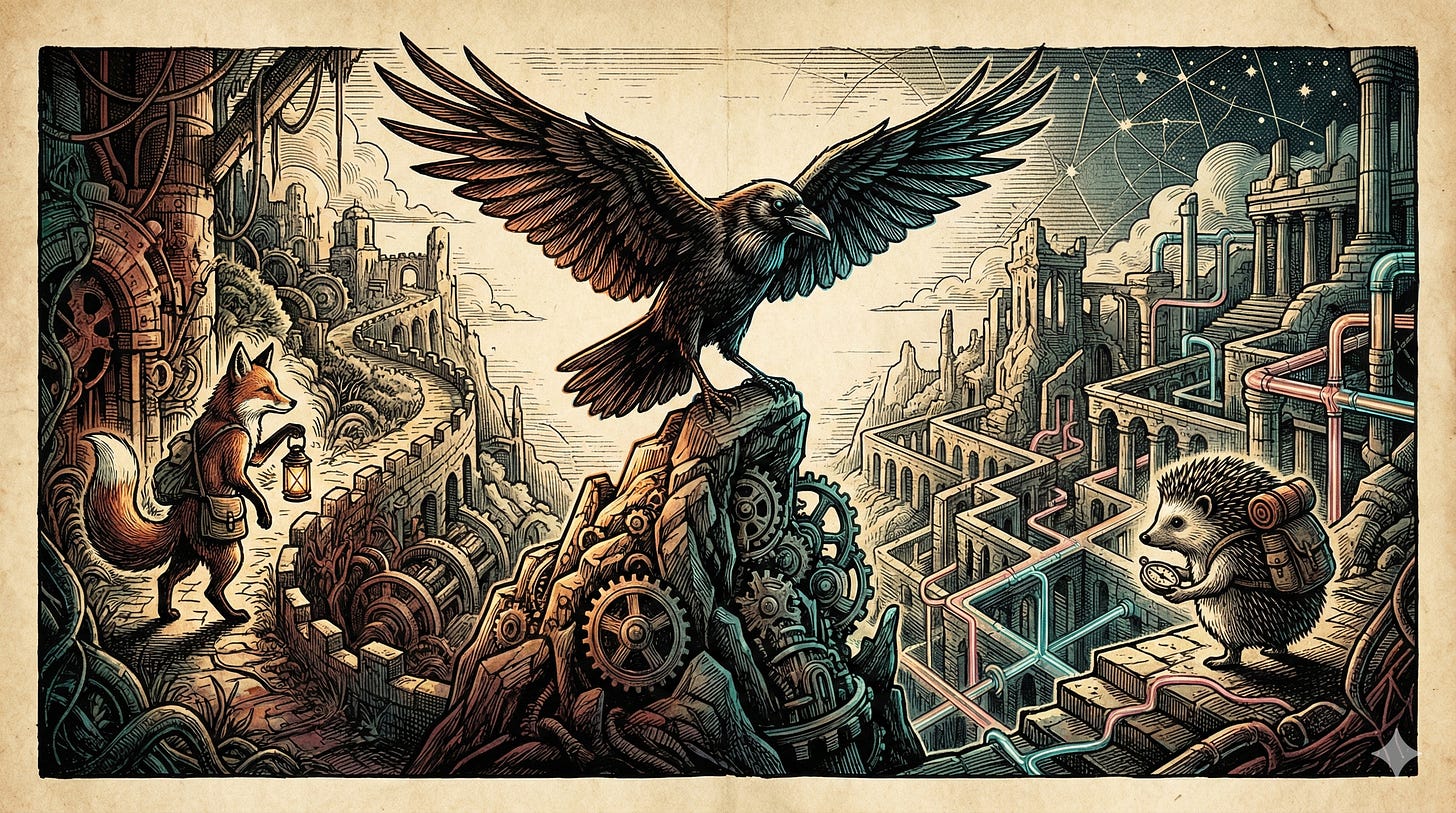
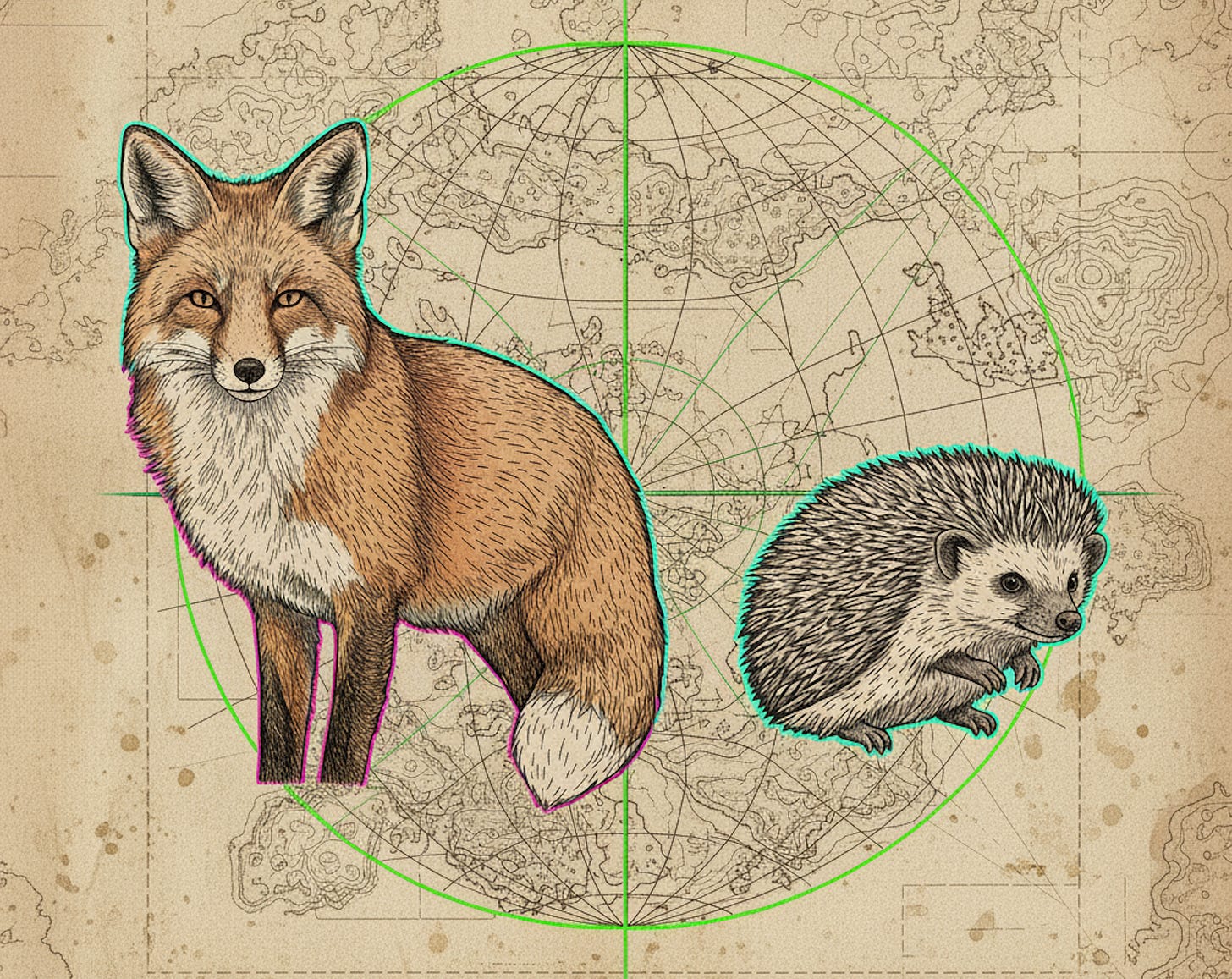
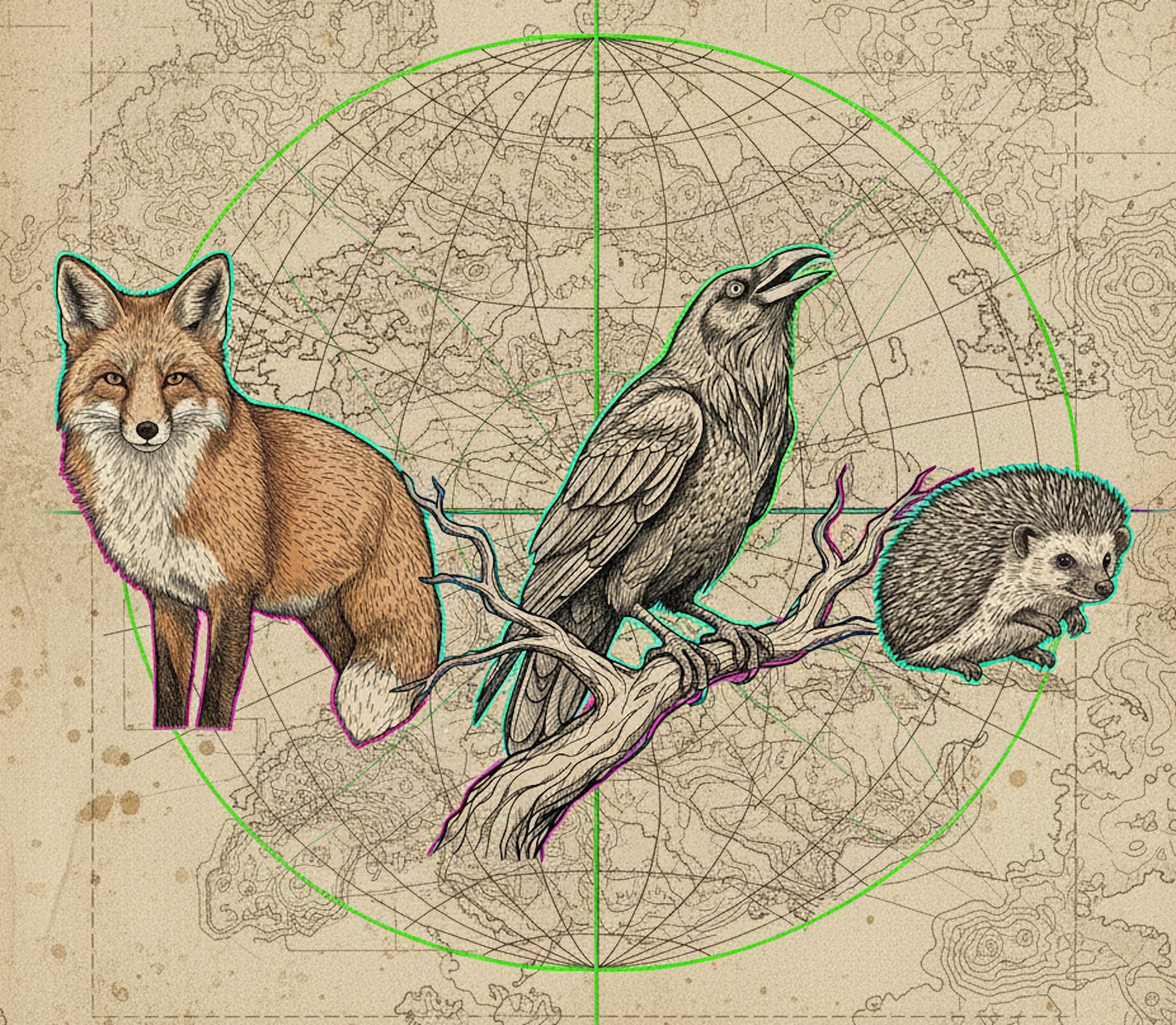
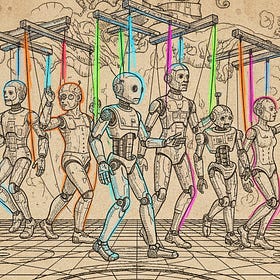

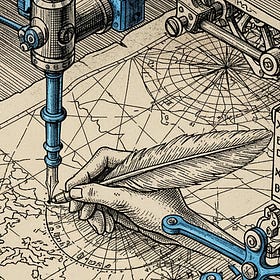
Until recently, I exactly saw it as a liability having multiple interests and lacking focus. One of my mentors then asked me a question: "How did it serve you in the past having a lack of focus?" It turned out, quite well when I look at my weird journey through life. Thanks for providing another gem to the community! It reinforces what I'm planning to do with my life.
Thanks for a great article, Jurgen! I recognize the relentless curiosity (and restlessness, and occasional loneliness, for me). Asking the people to "Let's be Ravens" makes a lot of sense, but I wonder how to inspire/teach/nudge/etc, as deep curiosity seems to be linked to personality and inventor types of people. How do you take people with you?